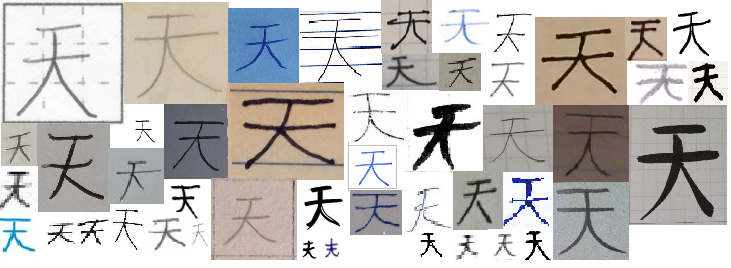About impersonating a character and some history and medicine
Nicolaas Herman Oving
When I teach Chinese medical Chinese classes ‘live’, one of the characters I most like to introduce is 天. A reason for that is that it is so demonstrable—physically demonstrable. First, there is 人 [rén]. Stand still, arms hanging down, and legs apart: 人. Then, stretch your arms wide: 大 [dà]. The step towards 天 requires more. While standing like 大 , first focus on your head, then let thoughts about the big wide space around and above you fill your head, making it larger and larger.
The best is to do this exercise outside, standing on real soil if possible. Also, try it on a clear night on a location where you can see stars.
The concept of 天 is also interesting from an historical perspective. It played an important role in the earliest forms of religion we know of and remained to be crucial in the structures of political power as well. From the earliest written records found and deciphered thus far, we have come to understand that in the early cultures we now call ‘Chinese’, divinity was experienced as ‘a complex network of integrated supernatural influences rather than as a power represented in the figure of a single antropomorphic deity’ (Major, p. 169).
During the Shang, the top part of that hierarchically structured network consisted of the deceased ancestral kings who were named Di after they passed on. Above them stood Shang Di, the ‘High God’ (上帝 [Shàngdì]). Ancestor worship and rituals for the dead (at their funerals, but to be continued after that) formed the core of religious life. 上帝 can be seen as ‘the ancestor of all ancestors’. During the Zhou, the top position was occupied by 天 [tiān], Heaven. Shang Di became one aspect of this larger power, Heaven. Heaven became the highest focus of worship. In relation to this, the ruler who stood on top was not longer called a king (王 [wáng]) but bore the title of 天子 [tiānzǐ], ‘Son of Heaven’. The Son of Heaven carried out the Mandate of Heaven 天命 [tiānmìng] (命 can also be rendered as ‘command’), and the state he ruled, viewed as the cosmic center, occupied ‘All Under Heaven’ 天下 [tiānxià].
The concept of heaven as overarching power that entrusts rulers with carrying out its mandate was projected on the past and formed a central idea in myths of origin. It continued to play a crucial role throughout history, and changes of power in China are always associated with the ‘losing of the Mandate of Heaven’.
Towards the end of the Warring States period the meaning of 天 shifted from ‘heaven’ towards ‘heaven/nature’. We can see this as the beginning of a process of demystification and rationalization that took more shape during the Han and in the formulations of the principles of Chinese medicine. The concept of 天 heaven, or ‘heaven/nature’, became essential in Chinese medical philosophy.
The definition and explanation in the Practical Dictionary of Chinese Medicine reads:
天 tiān : The sky or heavens; the highest cosmic principle or force.
The Chinese concept of heaven includes not only the physical sky or space covering the earth, but also weather and the seasons, and the notion of Nature and the forces and laws that govern it.
In the realm of politics, heaven is (or was believed to be) able to give indications to rulers whether their government was sound or not. Natural phenomena such as specific star constellations, floods, plagues, etc. were the means of heaven to do so. Likewise, in the realm of medicine, heaven (and earth) indicators could warn humans about improper government of their individual bodies. (see Suwen 20)
Furthermore, in the system of correspondences that is seen as the foundation of Chinese medical thinking, heaven is yang and earth is yin – as stated in Suwen 29:
陽者天氣也主外
陰者地氣也主內
Yang is the qi of heaven. It governs the outer body.
Yin is the qi of earth. It governs the inner body.
A large part of physiology and pathology in Chinese medicine is an elaboration of these central concepts.
Heaven also plays a crucial and specific role in the doctrine of the Five Periods and Six Qi (五運六氣 [wǔyùn liùqì]) as documented in Suwen 66-74. This section, almost one third of the entire Suwen text, is discussed in detail in an appendix of Huang Di neijing suwen – Nature, knowledge, imagery in an ancient Chinese text – P. Unschuld’s introduction to his Suwen translation.
As can be glimpsed from this brief overview, the concept of 天 plays an important role in the religion, politics, culture and philosophy of China. What makes it of even more interest for me is that I carry this character with me all the time. I can express it with my body and, while doing that, reflect on the meaning of life. It tells a story in a beautifully simple way.
Vocabulary
天 [tiān]
上 [shàng]
下 [xià]
上帝 [Shàngdì]
天下 [tiānxià]
天子 [tiānzǐ]
天命 [tiānmìng]
Literature
– Major, John S. and Constance A. Cook, Ancient China – A History, Routledge, 2017.
– Unschuld, Paul U., Huang Di nei jing su wen – Nature, knowledge, imagery in an ancient Chinese text, University of California Press, 2003.
– Wiseman, Nigel and Feng Ye, A Practical Dictionary of Chinese Medicine, Paradigm Publications, 1998.

